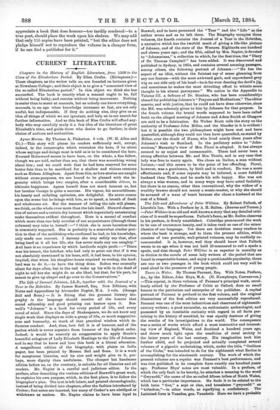sound editorship and good printing can bestow upon it. Bus.
well's "Johnson" is a book for every period of life, and every mood of mind. Since the days of Shakespeare, we do not know any single work that displays so wide a grasp of life, so much suggestive- ness and humanity, so much of that practical wisdom which in- fluences conduct. And, then, how full it is of humour, and of the pathos which is never separate from humour of the highest order. Indeed, it would be scarcely an exaggeration to apply Steele's beautiful eulogium of Lady Elizabeth Hastings to the life of Johnson, and to say that to know and love this book is a liberal education. A magnificent edition of the biography, with plates on India paper, has been printed by Messrs. Bell and Sons. It is a work for sumptuous libraries, and its size and weight give to it, per- haps, snore dignity than usefulness. The cheaper but handsome edition before us, on the contrary, is suitable for all libraries and all readers. Mr. Napier is a careful and judicious editor. In the preface, after describing the various editions of Boawell's great work, he explains his own purpose, which, in the first place, is to follow the biographer's plan. The text is left intact, and printed chronologically, instead of being divided into chapters, after the fashion introduced by Croker; foot-notes are inserted, but many of Croker's are abridged or withdrawn as useless. Mr. Napier claims to have been loyal to
Boswell, and to have presented the " Tour " and the " Life " as the author wrote and as he left them. The Biography occupies three volumes, the fourth contains the Journal of a Tour in the Hebrides, a narrative which has the twofold merit of giving a life-like picture of Johnson, and of the state of the Western Highlands one hundred
and eleven years ago ; and the fifth, edited by Mrs. Napier, is devoted to "Johnsoniana," a collection to which, for the first time, the "Diary of Dr. Thomas Campbell" has been added. It was discovered and published in Sydney, in 1854, and contains several amusing passages, among others, the following portrait of Johnson :—" He has the aspect of an idiot, without the faintest ray of sense gleaming from any one feature—with the most awkward garb, and unpowdered grey wig on one side only of his head—be is for ever dancing the devil's jig, and sometimes he makes the most drivelling effort to whistle some thought in his absent paroxysms." We notice in the Appendix to Volume III. a defence of Dr. Stmhan, who has been considerablyr abused for publishing Johnson's "Prayers and Meditations." The editor asserts, and with justice, that he could not have done otherwise, since the MS. was solemnly given to him by Johnson for that purpose. Ia the fourth volume the brutal words supposed to have been called forth on the alleged meeting of Johnson and Adam Smith at Glasgow are said to be a fabrication. Sir Walter Scott tells the story on the authority of Professor John Millar, and the blunder in it is evident ; but it is possible the two philosophers might have met and have quarrelled, although they could not then have quarrelled, as stated by Millar, over the death of Hume, who lived nearly three years after Johnson's visit to Scotland. In the prefatory notice to "John- soniana," Macaulay's view of Mrs. Piozzi is adopted. It has always seemed to us unjust and unreasonable. There had never been a strong affection between Mr. and Mrs. Thrale, and in any case that lady was free to marry again. She chose an Italian, a man without fortune,—and this seems to be the point of her offending. Piozzi, however, was a gentleman, by birth and in conduct. He was a more affectionate and, if some reports may be believed, a more faithful husband than Thrale, and he made his wife happy. She was not always a wise woman, and in many ways may have acted foolishly, but there is no reason, other than conventional, why the widow of a wealthy brewer should not marry a music-master, or why she should be accused of a want of heart because she chose a husband at the cost of a friend.


































 Previous page
Previous page